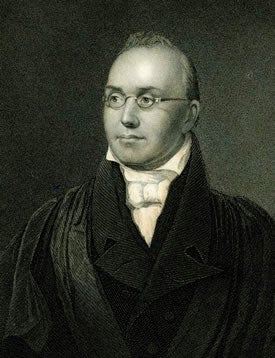Digitized materials give new perspective on a storied figure
Supreme Court Justice Joseph Story not only became Dane Professor at Harvard Law School while serving on the Court. In addition, like all Supreme Court justices in his era, he also sat on a federal Circuit Court.
Little is known about the relationship between Supreme Court justices and the lower court judges with whom they sat. A series of letters from Story to Judge John Pitman, which has been recently digitized by Harvard Law School, throws light on this subject. The 91 letters are available online as part of a digital suite of Story materials.
The Story-Pitman letters depict Story as a mentor to a young colleague: “As to your studies,” he wrote to Pitman in early 1820, “you must read all the public laws of the United States through once. Make a list of references and an Index to all principal provisions which concern crimes, revenue, etc. etc. … This will be a good winter’s work.”
They also show him at work on circuit business—from court procedure to doctrinal questions, many of a commercial or maritime nature. Story also wrote candidly about national politics in the 1830s and 1840s and about his growing fear for the future of the Constitution and the federal Union.
The letters also reveal a warm friendship. Story ended a letter to Pitman in 1844: “I have not time to say more, but only to add my kindest regards to Mrs. Pitman & the family, & I am most truly and affectionately Yours, … ”
Story’s duties required him to hold court twice yearly in each of the states in his judicial circuit—in addition to his regular travel to the Supreme Court in Washington, D.C. This punishing schedule, combined with his law school duties, took a toll on Story’s health, a topic frequently referenced in the correspondence.
Only a month before his death, Story was still fully engaged in circuit business, as he remarked in one of his last letters to Pitman. “Nothing on earth but a sense of public duty would now induce me to try the cause after it has been so neglected,” he wrote regarding an upcoming trial.
Story died in 1845 at age 65. Pitman’s letter to Story’s widow, Sarah, attests to the justice’s influence and kindness: “I have lost the stay and staff of my age and one to whom I always went nor went in vain for advice and sympathy,” Pitman wrote.
